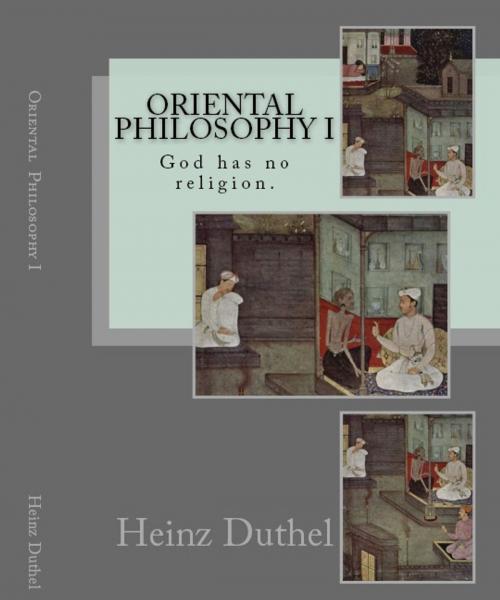Oriental Philosophy I
God has no religion.
Nonfiction, Religion & Spirituality, Eastern Religions, Hinduism, Zen Buddhism, Buddhism| Author: | Heinz Duthel | ISBN: | 1230000126611 |
| Publisher: | Heinz Duthel | Publication: | April 21, 2013 |
| Imprint: | Language: | English |
| Author: | Heinz Duthel |
| ISBN: | 1230000126611 |
| Publisher: | Heinz Duthel |
| Publication: | April 21, 2013 |
| Imprint: | |
| Language: | English |
Eastern philosophy includes the various philosophies of Asia, including Chinese philosophy, Iranian philosophy, Japanese philosophy, Indian philosophy and Korean philosophy. The term can also sometimes include Babylonian philosophy and Islamic philosophy, though these may also be considered Western philosophies.
Classification
Eastern philosophy includes the various philosophies of Asia, including Indian philosophy, Chinese philosophy, Iranian philosophy, Japanese philosophy, Korean philosophy, Arab philosophy and Jewish philosophy. The division is not purely geographic but also stems from general hermeneutic and conceptual differences that lay between Eastern and Western traditions.
Supreme God and the demigods
Because of its origin from within the Abrahamic religions, some Western philosophies have formulated questions on the nature of God and his relationship to the universe based on Monotheistic framework within which it emerged. This has created a dichotomy among some Western philosophies between secular philosophies and religious philosophies which develop within the context of a particular monotheistic religion's dogma, especially some creeds of Protestant Christianity, regarding the nature of God and the universe.
Eastern religions have not been as concerned by questions relating to the nature of a single God as the universe's sole creator and ruler. The distinction between the religious and the secular tends to be much less sharp in Eastern philosophy, and the same philosophical school often contains both religious and philosophical elements. Thus, some people accept the so-called metaphysical tenets of Buddhism without going to a temple and worshipping. Some have worshipped the Taoist deities religiously without bothering to delve into the theologial underpinnings, while others embrace the Taoist religion while ignoring the mythological aspects.
This arrangement stands in marked contrast to some recent philosophy in the West, which has traditionally enforced either a completely unified philosophic/religious belief system (for example, the various sects and associated philosophies of Christianity, Judaism, and Islam), or a sharp and total repudiation of some forms of religion by philosophy (for example, Nietzsche, Marx, Voltaire, etc.).
Comparative religion
A common thread that often differentiates Eastern philosophy from Western is the relationship between the gods (or God) and the universe. Some Western schools of thought were animistic or pantheistic, such as the classical Greek tradition, while later religious beliefs, influenced by the monotheism of the Abrahamic religions, portrayed divinity as more transcendent.
Much like the classical Greek philosophies, many Eastern schools of thought were more interested in explaining the natural world via universal patterns; without recourse to capricious agencies like gods (or God). Syncretism allowed various schools of thought such as Yi, Yin yang, Wu xing and Ren to mutually complement one another without threatening traditional religious practice or new religious movements.
Syntheses of Eastern and Western philosophy
There have been many modern attempts to integrate Western and Eastern philosophical traditions.
Arthur Schopenhauer developed a philosophy that was essentially a synthesis of Hinduism with Western thought. He anticipated that the Upanishads (primary Hindu scriptures) would have a much greater influence in the West than they have had. However, Schopenhauer was working with heavily flawed early translations (and sometimes second-degree translations), and many feel that he may not necessarily have accurately grasped the Eastern philosophies which interested him.
Recent attempts to incorporate Western philosophy into Eastern thought include the Kyoto School of philosophers, who combined the phenomenology of Husserl with the insights of Zen Buddhism. Watsuji Tetsurô, a 20th century Japanese philosopher attempted to combine the works of Søren Kierkegaard, Nietzsche, and Heidegger with Eastern philosophies. Some have claimed that there is also a definite eastern element within Heidegger's philosophy. For the most part this is not made explicit within Heidegger's philosophy, apart from in the dialogue between a Japanese and inquirer. Heidegger did spend time attempting to translate the Tao Te Ching into German, working with his Chinese student Paul Hsaio. It has also been claimed that much of Heidegger's later philosophy, particularly the sacredness of Being, bears a distinct similarity to Taoist ideas. There are clear parallels between Heidegger and the work of Kyoto School, and ultimately, it may be read that Heidegger's philosophy is an attempt to 'turn eastwards' in response to the crisis in Western civilization. However, this is only an interpretation.
The 20th century Hindu guru Sri Aurobindo was influenced by German Idealism and his Integral yoga is regarded as a synthesis of Eastern and Western thought. The German phenomenologist Jean Gebser's writings on the history of consciousness referred to a new planetary consciousness that would bridge this gap. Followers of these two authors are often grouped together under the term Integral thought.
Swiss psychologist Carl Jung was deeply influenced by his interest in the I Ching. The I Ching (Book of Changes) is an ancient text in China, dating back to the Shang Dynasty (Bronze Age 1700BC-1050BC), and utilizes a system of Yin and Yang which it places into Hexagrams for the purposes of divination. Carl Jung's idea of synchronicity moves towards an Oriental view of causality, as he states in the foreword to Richard Wilhelm's translation of the I Ching (Book of Changes). He explains that this Chinese view of the world is based not on science as the West knows it, but on chance.
Eastern philosophy includes the various philosophies of Asia, including Chinese philosophy, Iranian philosophy, Japanese philosophy, Indian philosophy and Korean philosophy. The term can also sometimes include Babylonian philosophy and Islamic philosophy, though these may also be considered Western philosophies.
Classification
Eastern philosophy includes the various philosophies of Asia, including Indian philosophy, Chinese philosophy, Iranian philosophy, Japanese philosophy, Korean philosophy, Arab philosophy and Jewish philosophy. The division is not purely geographic but also stems from general hermeneutic and conceptual differences that lay between Eastern and Western traditions.
Supreme God and the demigods
Because of its origin from within the Abrahamic religions, some Western philosophies have formulated questions on the nature of God and his relationship to the universe based on Monotheistic framework within which it emerged. This has created a dichotomy among some Western philosophies between secular philosophies and religious philosophies which develop within the context of a particular monotheistic religion's dogma, especially some creeds of Protestant Christianity, regarding the nature of God and the universe.
Eastern religions have not been as concerned by questions relating to the nature of a single God as the universe's sole creator and ruler. The distinction between the religious and the secular tends to be much less sharp in Eastern philosophy, and the same philosophical school often contains both religious and philosophical elements. Thus, some people accept the so-called metaphysical tenets of Buddhism without going to a temple and worshipping. Some have worshipped the Taoist deities religiously without bothering to delve into the theologial underpinnings, while others embrace the Taoist religion while ignoring the mythological aspects.
This arrangement stands in marked contrast to some recent philosophy in the West, which has traditionally enforced either a completely unified philosophic/religious belief system (for example, the various sects and associated philosophies of Christianity, Judaism, and Islam), or a sharp and total repudiation of some forms of religion by philosophy (for example, Nietzsche, Marx, Voltaire, etc.).
Comparative religion
A common thread that often differentiates Eastern philosophy from Western is the relationship between the gods (or God) and the universe. Some Western schools of thought were animistic or pantheistic, such as the classical Greek tradition, while later religious beliefs, influenced by the monotheism of the Abrahamic religions, portrayed divinity as more transcendent.
Much like the classical Greek philosophies, many Eastern schools of thought were more interested in explaining the natural world via universal patterns; without recourse to capricious agencies like gods (or God). Syncretism allowed various schools of thought such as Yi, Yin yang, Wu xing and Ren to mutually complement one another without threatening traditional religious practice or new religious movements.
Syntheses of Eastern and Western philosophy
There have been many modern attempts to integrate Western and Eastern philosophical traditions.
Arthur Schopenhauer developed a philosophy that was essentially a synthesis of Hinduism with Western thought. He anticipated that the Upanishads (primary Hindu scriptures) would have a much greater influence in the West than they have had. However, Schopenhauer was working with heavily flawed early translations (and sometimes second-degree translations), and many feel that he may not necessarily have accurately grasped the Eastern philosophies which interested him.
Recent attempts to incorporate Western philosophy into Eastern thought include the Kyoto School of philosophers, who combined the phenomenology of Husserl with the insights of Zen Buddhism. Watsuji Tetsurô, a 20th century Japanese philosopher attempted to combine the works of Søren Kierkegaard, Nietzsche, and Heidegger with Eastern philosophies. Some have claimed that there is also a definite eastern element within Heidegger's philosophy. For the most part this is not made explicit within Heidegger's philosophy, apart from in the dialogue between a Japanese and inquirer. Heidegger did spend time attempting to translate the Tao Te Ching into German, working with his Chinese student Paul Hsaio. It has also been claimed that much of Heidegger's later philosophy, particularly the sacredness of Being, bears a distinct similarity to Taoist ideas. There are clear parallels between Heidegger and the work of Kyoto School, and ultimately, it may be read that Heidegger's philosophy is an attempt to 'turn eastwards' in response to the crisis in Western civilization. However, this is only an interpretation.
The 20th century Hindu guru Sri Aurobindo was influenced by German Idealism and his Integral yoga is regarded as a synthesis of Eastern and Western thought. The German phenomenologist Jean Gebser's writings on the history of consciousness referred to a new planetary consciousness that would bridge this gap. Followers of these two authors are often grouped together under the term Integral thought.
Swiss psychologist Carl Jung was deeply influenced by his interest in the I Ching. The I Ching (Book of Changes) is an ancient text in China, dating back to the Shang Dynasty (Bronze Age 1700BC-1050BC), and utilizes a system of Yin and Yang which it places into Hexagrams for the purposes of divination. Carl Jung's idea of synchronicity moves towards an Oriental view of causality, as he states in the foreword to Richard Wilhelm's translation of the I Ching (Book of Changes). He explains that this Chinese view of the world is based not on science as the West knows it, but on chance.















